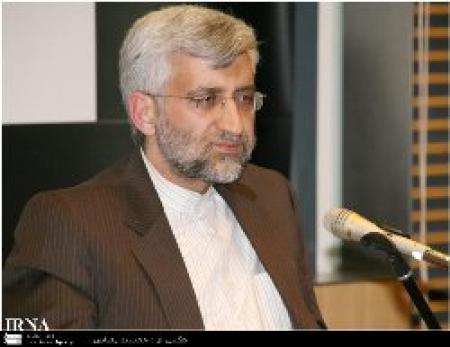ID :
96420
Wed, 12/23/2009 - 13:30
Auther :
Shortlink :
http://m.oananews.org//node/96420
The shortlink copeid
Jalili: Nuclear weapons cannot provide security in world

Tokyo, Dec 23, IRNA – Secretary of Iran's Supreme National Security Council and chief nuclear negotiator Saeed Jalili said that Tehran believes nuclear weapons cannot ensure security in the world.
In a meeting with Japanese nuclear experts in the venue of Iran's embassy here on Tuesday afternoon, Jalili expounded on Iran's nuclear approach.
He said, "We believe nuclear weapons have no legitimacy and international ties should not be based upon military nuclear power of certain countries."
Criticizing the fact that after 40 years of approving Non-Proliferation Treaty (NPT), disarmament has not been implemented in the world, Jalili said according to the article six of the NPT, the world nuclear powers should be disarmed and no country should have nuclear weapons.
Jalili pointed out that after the World War II and after atomic bombardment of Hiroshima and Nagasaki, not only disarmament plans were not implemented, but also more countries gained access to the nuclear weapons.
In the past 60 years, nuclear weapons have brought the most challenges to the world people, Jalili noted.
"We should not allow weakening of the NPT, but through strengthening the NPT we should strengthen international bodies," he added.
Iran is a responsible member of the International Atomic Energy Agency (IAEA) and NPT and has been committed to all of its obligations, and even more, sometimes has done actions voluntarily, Jalili pointed out.
In this direction, Iran suspended its uranium enrichment activities for two years and executed Additional Protocol voluntarily and allowed IAEA's inspectors to visit its nuclear installations, said Jalili.
He added, Iran issued permission for 3,000 person/day inspection of its installations which resulted in 21 reports of the IAEA Director General Mohammad El Baradei that the agency had not found any document on Iran's deviation from its peaceful nuclear program.
Jalili further stated that the research reactor in Tehran which produces special medicine for around 850,000 patients, generally cancerous patients; fuel of the reactor is finishing and Iran in a letter informed IAEA and asked for supplying needed fuel for the reactor.
The agency submitted the letter just to the USA and Russia and did not distribute it among all members.
At first, Russia accepted to sell the fuel, but after a few days, they changed their mind and then the USA presented a new plan about exchanging enriched fuel, he noted.
World nuclear powers cannot establish ties between nations upon atomic weapons, Jalili said adding that Afghanistan and Iraq are two good witnesses in this concern.
He said international ties should be formed upon justice because if they are formed upon military power, it would create a tragedy./end
In a meeting with Japanese nuclear experts in the venue of Iran's embassy here on Tuesday afternoon, Jalili expounded on Iran's nuclear approach.
He said, "We believe nuclear weapons have no legitimacy and international ties should not be based upon military nuclear power of certain countries."
Criticizing the fact that after 40 years of approving Non-Proliferation Treaty (NPT), disarmament has not been implemented in the world, Jalili said according to the article six of the NPT, the world nuclear powers should be disarmed and no country should have nuclear weapons.
Jalili pointed out that after the World War II and after atomic bombardment of Hiroshima and Nagasaki, not only disarmament plans were not implemented, but also more countries gained access to the nuclear weapons.
In the past 60 years, nuclear weapons have brought the most challenges to the world people, Jalili noted.
"We should not allow weakening of the NPT, but through strengthening the NPT we should strengthen international bodies," he added.
Iran is a responsible member of the International Atomic Energy Agency (IAEA) and NPT and has been committed to all of its obligations, and even more, sometimes has done actions voluntarily, Jalili pointed out.
In this direction, Iran suspended its uranium enrichment activities for two years and executed Additional Protocol voluntarily and allowed IAEA's inspectors to visit its nuclear installations, said Jalili.
He added, Iran issued permission for 3,000 person/day inspection of its installations which resulted in 21 reports of the IAEA Director General Mohammad El Baradei that the agency had not found any document on Iran's deviation from its peaceful nuclear program.
Jalili further stated that the research reactor in Tehran which produces special medicine for around 850,000 patients, generally cancerous patients; fuel of the reactor is finishing and Iran in a letter informed IAEA and asked for supplying needed fuel for the reactor.
The agency submitted the letter just to the USA and Russia and did not distribute it among all members.
At first, Russia accepted to sell the fuel, but after a few days, they changed their mind and then the USA presented a new plan about exchanging enriched fuel, he noted.
World nuclear powers cannot establish ties between nations upon atomic weapons, Jalili said adding that Afghanistan and Iraq are two good witnesses in this concern.
He said international ties should be formed upon justice because if they are formed upon military power, it would create a tragedy./end





